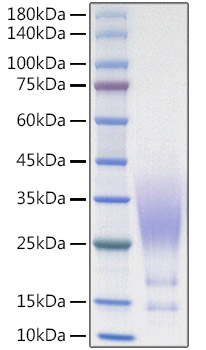Description
Recombinant Human CX3CL1/Fractalkine Protein
The Recombinant Human CX3CL1/Fractalkine Protein is a biologically active recombinant protein that plays a significant role in various cellular processes and signaling pathways in human biology. This protein is widely employed in immunological research, cell biology studies, protein-protein interaction analyses, and therapeutic development, providing researchers with a reliable tool for investigating CX3CL1/Fractalkine function and its implications in health and disease.
This product (SKU: RPCB1159) is produced using Pichia and features a C-6His tag for convenient detection and purification. The protein exhibits a calculated molecular weight of 9.47 kDa with an observed molecular weight of 15, 25-35 kDa under denaturing conditions, achieving ≥ 90 % as determined by SDS-PAGE., ensuring exceptional quality and consistency for research applications.
Key Features
| High Purity by Affinity Chromatography | |
| Mammalian & Bacterial Expression Systems | |
| High lot-to-lot consistency via strict QC |
| Product Name: | Recombinant Human CX3CL1/Fractalkine Protein |
| SKU: | RPCB1159 |
| Size: | 10 μg , 20 μg , 50 μg |
| Reactivity: | Human |
| Synonyms: | NTN, NTT, CXC3, CXC3C, SCYD1, ABCD-3, C3Xkine, fractalkine, neurotactin |
| Tag: | C-6His |
| Expression Host: | Pichia |
| Calculated MW: | 9.47 kDa |
| Observed MW: | 15, 25-35 kDa |
| Gene ID: | 6376 |
| Protein Description: | High quality, high purity and low endotoxin recombinant Recombinant Human CX3CL1/Fractalkine Protein (RPCB1159), tested reactivity in Pichia and has been validated in SDS-PAGE.100% guaranteed. |
| Endotoxin: | < 0.1 EU/μg of the protein by LAL method. |
| Purity: | ≥ 90 % as determined by SDS-PAGE. |
| Formulation: | Lyophilized from a 0.22 μm filtered solution of PBS, pH 7.4. |
| Reconstitution: | Centrifuge the vial before opening. Reconstitute to a concentration of 0.1-0.5 mg/mL in sterile distilled water. Avoid vortex or vigorously pipetting the protein. For long term storage, it is recommended to add a carrier protein or stablizer (e.g. 0.1% BSA, 5% HSA, 10% FBS or 5% Trehalose), and aliquot the reconstituted protein solution to minimize free-thaw cycles. |
| Storage: | Store at -20℃.Store the lyophilized protein at -20℃ to -80 ℃ up to 1 year from the date of receipt. After reconstitution, the protein solution is stable at -20℃ for 3 months, at 2-8℃ for up to 1 week. |
Fractalkine or Chemokine (C-X3-C motif) ligand 1 (CX3CL1) is a member of the CX3C chemokine family. Fractalkine / CX3CL1 is a unique chemokine that functions not only as a chemoattractant but also as an adhesion molecule and is expressed on endothelial cells activated by proinflammatory cytokines, such as interferon-gamma and tumor necrosis factor-alpha. Fractalkine/CX3CL1 is expressed in a membrane-bound form on activated endothelial cells and mediates attachment and firm adhesion of T cells, monocytes and NK cells. Fractalkine / CX3CL1 is associated with dendritic cells (DC) in epidermis and lymphoid organs. The fractalkine receptor, CX3CR1, is expressed on cytotoxic effector lymphocytes, including natural killer (NK) cells and cytotoxic T lymphocytes, which contain high levels of intracellular perforin and granzyme B, and on macrophages. Soluble fractalkine causes migration of NK cells, cytotoxic T lymphocytes, and macrophages, whereas the membrane-bound form captures and enhances the subsequent migration of these cells in response to secondary stimulation with other chemokines.







